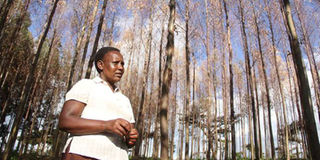Concrete pylons dim farmers’ hope for eucalyptus windfall

Celina Kosgey explains about eucalyptus trees at her farm in Kapng'etuny village, Uasin Gishu County that dried up on May 27, 2015. The entry of concrete pylons into the power transmission sector is leaving a large number of commercial tree farmers standing on shaky grounds. PHOTO | JARED NYATAYA (Eldoret).
What you need to know:
- KFS director Emilio Mugo said some tree owners are likely to cut down their plantations. This, he said, will affect the country’s forest cover that stands at 7.2 per cent against the global recommended 10 per cent.
The entry of concrete pylons into the power transmission sector is leaving a large number of commercial tree farmers standing on shaky grounds.
This is despite Kenya Power maintaining that wooden poles will be gradually phased out as they are still needed for the Last Mile Connectivity project.
Suppliers of wooden poles say the decision by the electricity distributor and the Rural Electrification Authority to shift to concrete will adversely affect those who have invested heavily on trees.
“The profitability of farm forestry is dictated by various factors including demand and supply forces and the changing trend from wooden poles to concrete pylons will mean unreliable market for farmers,” said Mr Joshua Boit who farms eucalyptus.
Kenya Power has spent over Sh7.9 billion in the last three financial years to purchase wooden and concrete poles.
“We have purchased 377,000 poles locally in the last two years to drive electrification programme. The poles were bought from more than 40 local companies involved in treatment of wooden poles and production of concrete ones in support of the government’s ‘buy Kenya build Kenya’ initiative,” said Kenya Power Managing Director Ben Chumo.
He said procurement of poles is expected to increase in the next four years with the implementation of the Last Mile Connectivity Project (LMCP), which aims at accelerating electricity rate in the country to 70 per cent up from the current 55 per cent by end of next year.
According of the power firm, wooden poles are required for low electricity connectivity and extension while the concrete ones are for high voltage connectivity.
Most preferred tree
Eucalyptus is the most preferred tree species planted by the majority of farmers because of its fast growth and ready market.
India is the leading eucalyptus growing country in the world followed by Brazil. South Africa is the highest cultivator of the tree in Africa.
The fears of dwindling market for eucalyptus farmers as a result of stiff competition from concrete pylons have been confirmed by the Kenya Forestry Services (KFS), saying it has engaged Kenya Power on how to avert possible losses to farmers.
KFS director Emilio Mugo said some tree owners are likely to cut down their plantations. This, he said, will affect the country’s forest cover that stands at 7.2 per cent against the global recommended 10 per cent.
“The eucalyptus plantations occupy about 100,000 hectares of land with over 500 large scale farmers involved in the private forestry business,” said Mr Mugo.
The country’s forest cover, he said, had grown from 6.99 per cent to 7.2 per cent over the past five years and the entry of concrete pylons in the power transmission sector will complicate the ambition to achieve the 10 per cent forest cover.
Some growers have said they now find it difficult to access the market for the produce and have instead opted to cut down the trees and shift to other investments.
“Most of the eucalyptus farmers invested in growing of the trees over the past 10 years with assurance of ready market from Kenya Power but they are having hard times following the entry of concrete poles,” said Mr Jacob Mwanduka, Gum Growers Group chairman.
Kenya Power has received funding from the International Development Association (IDA) to buy treated wooden poles for the Kenya Electricity Modernisation Project (KEMP).




